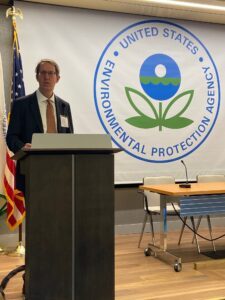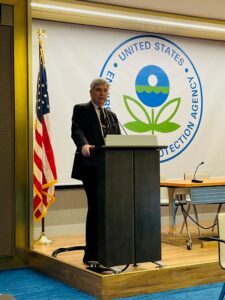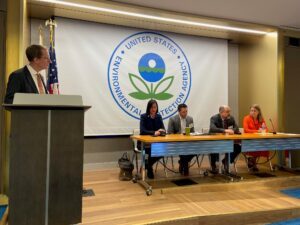
Transformational Coastal Management

On March 21st, more than 250 coastal restoration professionals, policy makers, and managers filled the auditorium at U.S. Environmental Protection Agency (EPA) headquarters in Washington, D.C for the first ever Transformational Coastal Management Meeting.
The standing room only event, hosted by RAE, Coastal States Organization, Association of National Estuary Programs, and the National Estuarine Research Reserve Association, aimed to shed light on the needs of coastal management practitioners and plot a road map forward for the future of coastal restoration and coastal resilience.
The day started with RAE’s President & CEO, Daniel Hayden, introducing Chair Brenda Mallory of the White House Council on Environmental Quality, who addressed the room via video. Chair Mallory, appointed by President Biden and confirmed by the Senate in 2021, talked about the monumental opportunity at hand with record funding for coastal and climate resilience from the Bipartisan Infrastructure Law and the Inflation Reduction Act.
We were also fortunate to have Senator Sheldon Whitehouse (RI), a longtime champion for coastal issues, join us in the afternoon, echoing Chair Mallory’s remarks about the magnitude of the current funding windfall and encouraging the crowd, consisting of practitioners from non-profits, government agencies, and private interests, that this windfall was not a once-in-a-lifetime opportunity but the new normal.

This sentiment quickly became the theme of the day.
Each of the eight sessions emphasized the continued need for federal funding and a forward-thinking approach tocoastal management, incorporating a future in which climate change becomes more severe and dangerous but also one in which all community members are engaged in the process and benefit from the outcomes.
This was specifically discussed on a panel titled Insights from the Next Generation: Diversifying our coastal partnerships & engaging future coastal managers. Facilitated by RAE’s own Philip McAdoo, and featuring RAE Board member Evlyn Andrade (EarthCorps), Jordana Cutajar (Delaware Department of Natural Resources & Environmental Control), and Mary Bryan Barksdale (Margaret A. Davidson Fellow – Chesapeake Bay NERR), this group took a deep dive into how we can and should incorporate local communities in the management of our coastal resources.
Traditionally underrepresented and underserved communities have often been left out of the planning and implementation of coastal restoration and management in cases where these decisions directly impact them. Our panelists tackled a bit of the history of this issue while also offering their suggestions for how we can improve.
One of their collective takeaways was the need for more training and implementation of community engagement and social science in graduate programs – so that professionals are ready to tackle these challenges at the start rather than having to learn on the job.
Another poignant suggestion to implement transformational coastal management practices was to seek and hire staff as diverse as the communities you serve with an emphasis on increased pay for employees, recognizing that many young people are supporting family members in addition to themselves. This could allow more people to enter the field earlier in their careers and give organizations and agencies the opportunity to recruit from a broader network of individuals who have unique and critical experiences that allow them to excel. This has also been a key takeaway from RAE’s own Inclusive Coasts Initiative.

Looking ahead, we are confident the lessons learned will help shape the agenda in the federal government and our partner organizations for the next decade and beyond. We’d like to thank our partners at EPA for hosting as well as staff from the National Oceanic and Atmospheric Administration (NOAA), U.S. Fish and Wildlife Service (USFWS) and the U.S. Army Corps of Engineers for joining us.
At the end of the day, everyone walked away with a similar feeling of optimism and hope – a belief that we can and will achieve the kind of transformational coastal management we hope for, but we can only do it with every member of the coastal community on board.
We look forward to gathering again in the future to track our progress and continue to find ways to improve.
